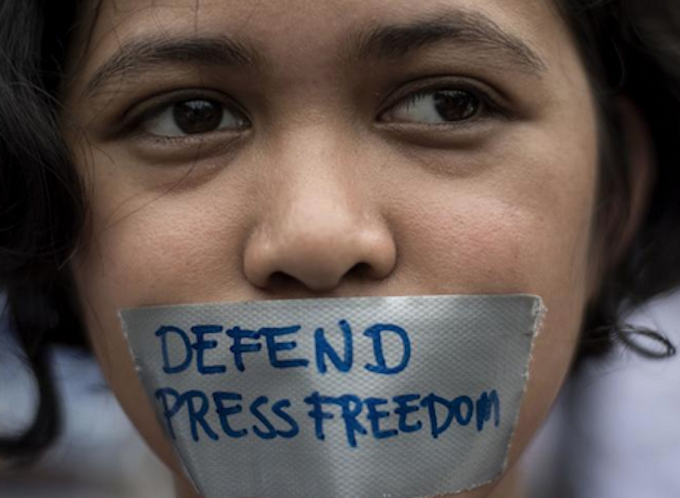COMMENTARY: By Ajay Bhai Amrit in Suva
Bula readers. As some of you might be aware, I am a member of various media bodies and human rights international bodies such as Amnesty International and Reporters Without Borders, who do an excellent job as a watchdog on human rights and also press freedom across the globe.
Every year a Press Freedom Index is compiled and published by Reporters Without Borders which gives a ranking of 180 countries worldwide and assesses them on their press freedom records and the degree of freedom that journalists, media outlets and news organisations have in reporting.
The study is very thorough and comprehensive which gives it international credibility and is also a yardstick for gauging the true measure of freedom the press actually has in each of the nations it assesses.
- READ MORE: ‘We’ll scrap Fiji’s Media Act … and allow free press,’ says Rabuka
- Other Fiji media freedom reports
Press freedom is defined as the ability of journalists as individuals and collectives to select, produce, and disseminate news in the public interest independent of political, economic, legal, and social interference and in the absence of threats to their physical and mental safety.
I am writing on press freedom to encourage our Fiji government and stakeholders that we need to do better as we have been ranked the worst nation in the Pacific for press freedom, which is really not a title to be proud of.
The evaluation criteria to get to this conclusion is a long and complex one, but to try and break it down briefly, there are the five RSF categories and indicators,
1. Political context – 33 questions and subquestions
They aim to evaluate:
- the degree of support and respect for media autonomy vis-à-vis political pressure from the state or from other political actors;
- the level of acceptance of a variety of journalistic approaches satisfying professional standards, including politically aligned approaches and independent approaches;
- the degree of support for the media in their role of holding politicians and government to account in the public interest.
2. Legal framework – 25 questions and subquestions
They concern the legislative and regulatory environment for journalists, in particular:
- the degree to which journalists and media are free to work without censorship or judicial sanctions, or excessive restrictions on their freedom of expression;
- the ability to access information without discrimination between journalists, and the ability to protect sources;
- the presence or absence of impunity for those responsible for acts of violence against journalists.
3. Economic context – 25 questions and subquestions
They aim to evaluate in particular:
- economic constraints linked to governmental policies (including the difficulty of creating a news media outlet, favouritism in the allocation of state subsidies, and corruption);
- economic constraints linked to non-state actors (advertisers and commercial partners);
- economic constraints linked to media owners seeking to promote or defend their business interests.
4. Sociocultural context – 22 questions and subquestions
They aim to evaluate in particular:
- social constraints resulting from denigration and attacks on the press based on such issues as gender, class, ethnicity and religion;
- cultural constraints, including pressure on journalists to not question certain bastions of power or influence or not cover certain issues because it would run counter to the prevailing culture in the country or territory.
5. Safety – 12 questions and subquestions
The questions concern journalists’ safety. For this purpose, press freedom is defined as the ability to identify, gather and disseminate news and information in accordance with journalistic methods and ethics, without unnecessary risk of:
- bodily harm (including murder, violence, arrest, detention and abduction);
- psychological or emotional distress that could result from intimidation, coercion, harassment, surveillance, doxing (publication of personal information with malicious intent), degrading or hateful speech, smears and other threats targeting journalists or their loved ones;
- professional harm resulting from, for example, the loss of one’s job, the confiscation of professional equipment, or the ransacking of installations. I felt it would be necessary to list how comprehensively thorough the organisation is in collecting information and data to make their assessment of countries and their willingness to let the public’s voice and their opinions be heard through the press without fear of reprisal.
The bad news is Fiji has a ranking of 102nd out of 180 countries in the world and to give you an example of where we are placed, just above us and in better positions are countries such as the Central African Republic, Botswana and Mongolia.
From a Pacific point of view, Papua New Guinea is ranked at 62, Tonga at 49 and Samoa at 45, which makes our ranking a national shame.
We really have some serious work in front of us to make media freedom truly something we can be proud of, because at present we are now the laughingstock of the Pacific.
Finally, we have an obligation as a nation to let our citizens have a voice and that voice is the press and the media.
Unfortunately, judging from the comprehensive and detailed ranking system that all the countries have been scrutinised under, we are falling far short of any kind of true freedom of press and freedom of media and that is the reality on the ground.
It is always a very serious issue indeed when the voices of the citizens cannot be heard and is suppressed through various laws and intimidation.
I believe we are better than this and have an obligation to improve our rankings to at the very least a satisfactory level and not one of a failed state.
What a national shame and what a sad reflection of our society in general. Take care and be safe.
Ajay Bhai Amrit is a founding member of the People’s Alliance party and is also a freelance writer. This article was first published in The Fiji Times and is republished with permission.











































